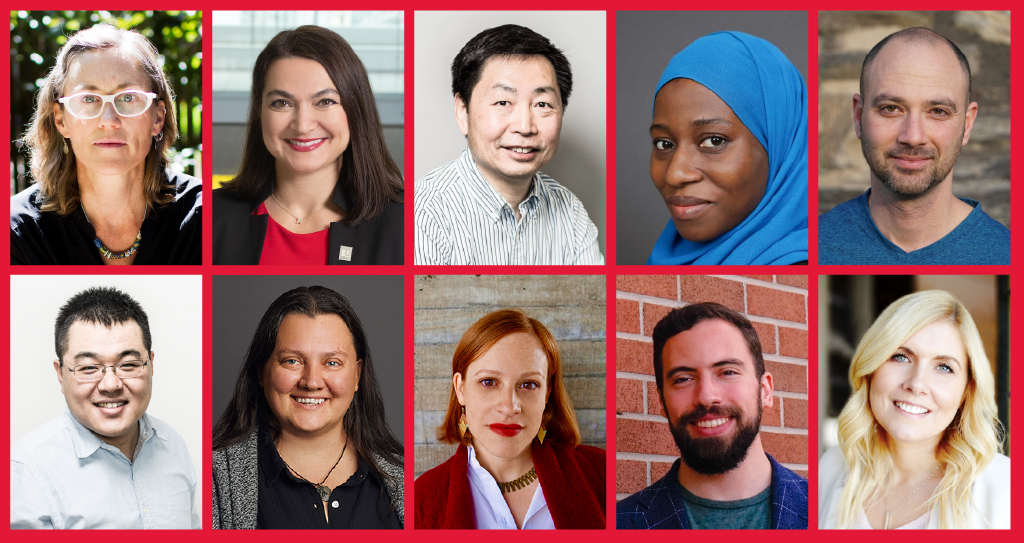
Ten York University researchers have been named new York Research Chairs (YRCs), an internal program that supports outstanding faculty members as they produce research and excel in their wide-ranging areas of study, including cognitive neuroscience, gender justice and molecular ecology, among others.
“The York Research Chairs program enables the University to celebrate and champion our exceptional research community as they pursue discovery, invention and innovation at the highest level in their respective fields, from using artificial intelligence to track and capture space debris to leveraging extended reality technologies for theatre and performance, and so much more,” said President and Vice-Chancellor Rhonda Lenton. “I extend a warm congratulations to the new Chairholders whose leading expertise, bolstered by this program, holds the potential to create significant impacts both in Canada and globally.”
This year’s YRCs are the 11th cohort to be appointed – as of July 1 – since the program was first launched by the Office of the Vice-President Research & Innovation (VPRI) in 2015.
“The new YRC appointments demonstrate the University’s continued commitment to research excellence and scholarship in all its forms, supporting the intensification and application of new knowledge for the benefit of our local and global communities,” said Amir Asif, vice-president research and innovation. “The YRC program also aligns with the University’s Strategic Research Plan, 'Knowledge for the Future: From Creation and Discovery to Application,' which aims to enhance York’s research strengths and accelerate the growth of our global impact.”
Five of the 10 new Chairs are funded by VPRI, while the other five are funded by Connected Minds: Neural and Machine Systems for a Healthy, Just Society – a major, $318-million, York-led research initiative focused on socially responsible technologies.
The YRC program is designed to offer a similar level of support as the federal government’s Canada Research Chairs program, which funds the work of world-class researchers and their teams at institutions across the country.
The YRC program consists of two tiers, both with five-year terms. Tier 1 is open to established research leaders at the rank of full professor. Tier 2 is aimed at emerging research leaders within 15 years of their first academic appointment.

Below are the new Chairholders and their respective fields of study.
Tier 1 York Research Chairs
York Research Chair in International Gender Justice and Peacebuilding
Annie Bunting, Faculty of Liberal Arts & Professional Studies
A professor of law and society, Bunting’s research as a YRC will examine the intersection of gender violence and international justice in conflict zones in Africa, with a particular focus on affected youth, sexual exploitation and abuse by United Nations peacekeepers, and issues that involve and centre survivors’ experiences.
York Research Chair in Intellectual Property, Artificial Intelligence and Emerging Technologies
Pina D’Agostino, Osgoode Hall Law School
As a YRC, D’Agostino, an associate professor of law and director of Connected Minds, will explore the role of intellectual property law in society’s increased adoption of emerging technologies, like artificial intelligence (AI), and the potential benefits and harms of a technology-driven society.
York Research Chair in Space Robotics and Artificial Intelligence
George Zhu, Lassonde School of Engineering
Zhu, a professor of mechanical engineering and director of the Space Engineering Design Laboratory, aims to develop swarm robotics technology through his YRC program. This technology involves a group of robots working together to autonomously clean up space debris in Earth orbits, which can negatively affect space exploration and satellite safety.
Tier 2 York Research Chairs
York Research Chair in Law and the Histories of Empire
Rabiat Akande, Osgoode Hall Law School
Akande, an assistant professor of law, will conduct research that examines how 19th- and 20th-century colonial powers governed racial and religious difference and explores the living legacies of that history. Her YRC program seeks to advance the understanding of the law’s role in European imperialism.
York Research Chair in Visual Cognitive Neuroscience
Erez Freud, Faculty of Health
Through the YRC program, Freud, an associate professor of psychology, will investigate the developmental brain processes that enable tasks such as hand movement and grasping in children. His research will examine how these processes might differ in children with autism, providing new insights into brain specialization.
York Research Chair in Software Engineering for Foundation Model-powered Systems
Jack Jiang, Lassonde School of Engineering
Jiang, an associate professor of electrical engineering and computer science, will use his YRC position to develop advanced engineering tools and processes aimed at facilitating the construction and enhancing the quality and trustworthiness of various generative AI systems like ChatGPT and Copilot.
York Research Chair in Molecular Ecology and Behavioural Genetics
Sandra Rehan, Faculty of Science
Rehan, a professor of biology, researches the evolution of bees and their role in biodiversity. As a YRC, Rehan will employ advanced DNA technology to investigate bee behaviour and genetics.
York Research Chair in Art, Technology and Global Activism
Laura Levin, School of the Arts, Media, Performance & Design
An associate professor of theatre and performance studies, Levin’s YRC program explores the artistic use of emerging technologies, like extended reality and AI, to address growing political polarization and misinformation and to develop imaginative methods for bridging political divides.
York Research Chair in Philosophy of Representation
Kevin Lande, Faculty of Liberal Arts & Professional Studies
An assistant professor of philosophy, Lande’s research as a YRC explores how the mind works, arguing that humans’ creative ability to combine simple ideas to create more complex ones extends beyond thought and language.
York Research Chair in Relationships and Sexuality
Amy Muise, Faculty of Health
An associate professor of psychology, Muise’s research as a YRC tests high-quality listening and leverages interdependence in romantic relationships to combat sexism and reduce harmful gender-based attitudes.
